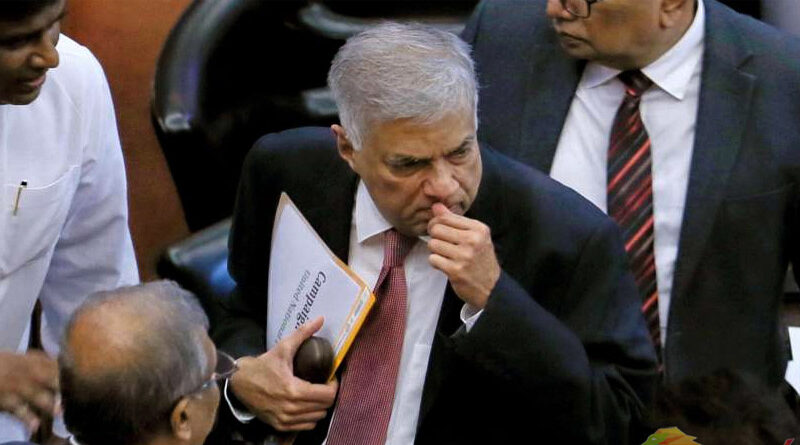Why has the swearing in of former Prime Minister Ranil Wickremesinghe as a UNP National List MP caused so much perturbation in Sri Lankan politics?
Policy politics and optimal diplomacy are still outside the realm of popular Sri Lankan politics. Apart from making unfulfilled political promises and inciting the masses by sowing racism or religiosity, the aim of this popular political culture is to deceive the people and achieve opportunistic goals in the short term. That is why many Sri Lankan politicians have to adore children, satisfy women and get hands on shoulders of the corrupt. Those who say that Ranil Wickremesinghe is not suitable for Sri Lankan politics also expect him to play the role of a leader who deceives the people with short-lived magical illusions that are swept away by the wave of popularity. But in Ranil Wickremesinghe’s long political career of more than four decades, no decisions have ever been made for cheap popularity; No attempt was made to hold on to power against the referendum. But he is still a world-renowned veteran diplomat; He is a principled politician who has matured by practicing extreme patience.
Despite the challenges faced by Sri Lankan political leaders and the relentless criticism and blame not only of the opposition but also of their own party members, all those who ended up in the storm had to say, “Ranil is right.” In the face of all the current challenges, such as the escalating Covid-19 epidemic, the economic crisis and the political-military dictatorship, the people are repeating “Ranil is right”. This article is not intended to exaggerate Ranil’s character, but to provide a brief overview of his role in Sri Lankan politics.
Born into an aristocratic family centered in Colombo, educated at the Royal College and later graduated from the Law Faculty of the University of Colombo, Ranil Wickremesinghe can be identified as additional factors that contributed to his political rise. Ranil’s political uniqueness lies in his commitment to liberalism, new technological leanings, confidence in a multi-ethnic society and social reconciliation outside the framework of traditional thinking. Popular racist politicians see Ranil as an enemy because of his incomprehensible peculiarities.
In Sri Lankan politics, which seeks to crush pagans in the name of Buddhism, Ranil Wickremesinghe uses the examples of Buddhism to answer his opponents logically and nonviolently. Instead of spreading hatred in the 51-day democratic struggle against dictatorship that arose with the then President’s arbitrary appointment of another Prime Minister on October 26, 2018, Ranil chose to respond to his opponents with the example of patience and Buddhism. Rather than making hair-raising arguments to shake the stage, Ranil’s sharp intellectual reasoning gave strength to that democratic struggle. It is not easy for a politician to gain the unwavering strength to stand firm in the face of any upheaval.
With the power of his principled politics, Ranil intervened to calm the turbulent political space created by the assassination of President Premadasa on May 1, 1993. As the UNP split over the impeachment of President Premadasa, Ranil remained steadfast in defending the party and its leadership. Ranil’s principledness is exemplified by the exemplary departure of the Prime Minister’s official post as soon as the UNP lost the 1994 parliamentary elections and Gamini Dissanayake’s support for the UNP’s presidential candidacy in 1999. But opponents as well as many UNP members saw these opportunities as Ranil’s weaknesses.
The peace talks and the Ceasefire Agreement, which Ranil Wickremesinghe intervened as Prime Minister in 2002 when Chandrika Bandaranaike was President, are a prime example of conflict management and peace building in Sri Lanka. It was through Ranil’s tactical diplomatic relations that the LTTE was persuaded to a long-term ceasefire as never before in history. Today no one speaks, but then Prabhakaran also called Ranil a “cunning fox” who trapped himself in an inescapable international trap. It was Ranil’s intervention that led to the sharp internal divisions that led to the military defeat of the LTTE. This is an important political factor that many analysts deliberately avoid.
Ranil, did not go to answer the thousands of allegations that he was the reason for the UNP’s continued defeat and remained silent even after his defeat in the 2005 presidential election. He allowed common candidates and abstained from running for the presidency three times. He also extended his full support to the candidates. But in the end, he refrained from criticizing his supporters even when they stood up against him. No one but a mature politician can face these challenges or face harsh criticism.
No one who engages in body politics can understand Ranil. He does politics using his mind and subtle tactical intellect. Those whose minds are not developed are unable to understand Ranil’s politics. It is clear that he wants a united Sri Lanka where all races can live in harmony. He clashes logically. That is why many do not understand Ranil. But misunderstanding is not a reason to reject Ranil. Coming to the fore in an unexpected moment in the face of the failures of the current regime, he is once again proving to be a powerful figure in Sri Lankan politics.
Dr. Indi Akurugoda,
Department of Public Policy, University of Ruhuna
